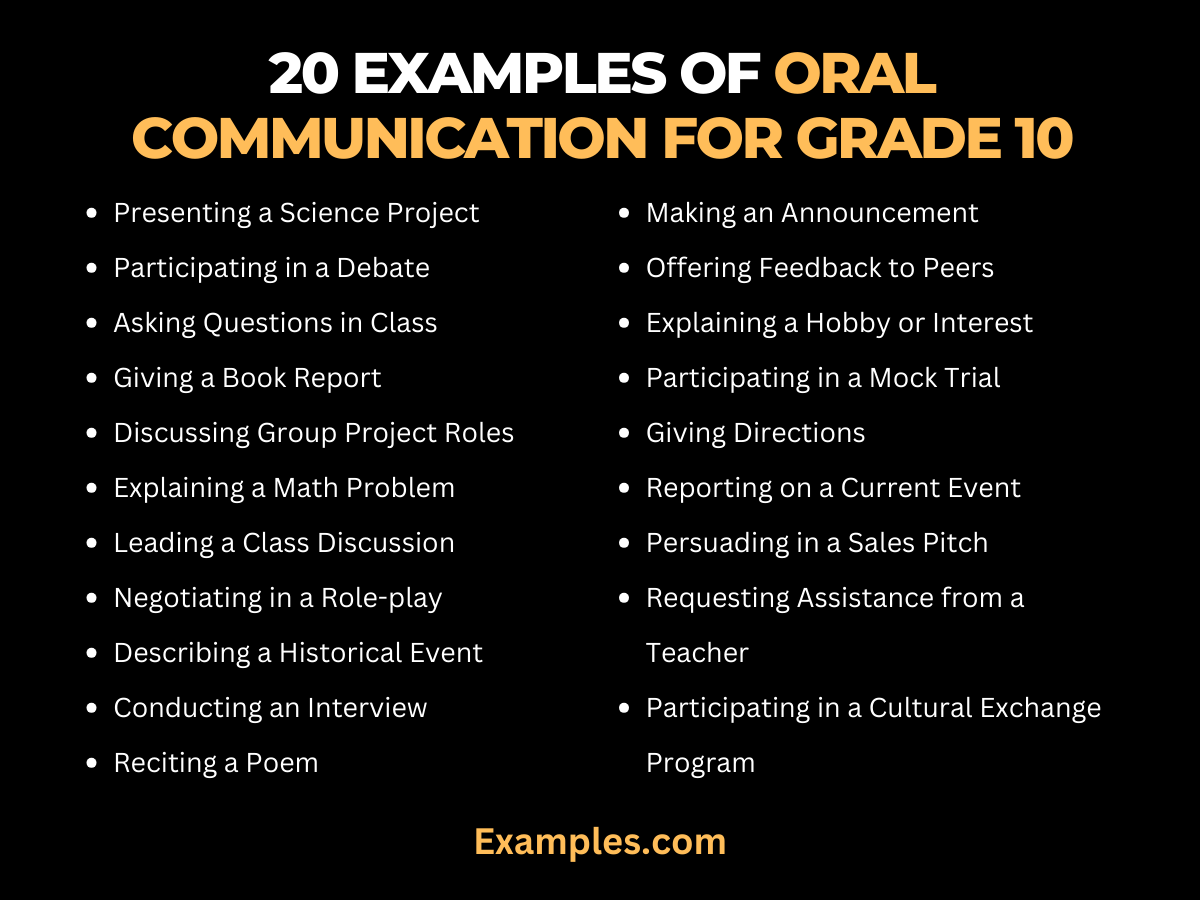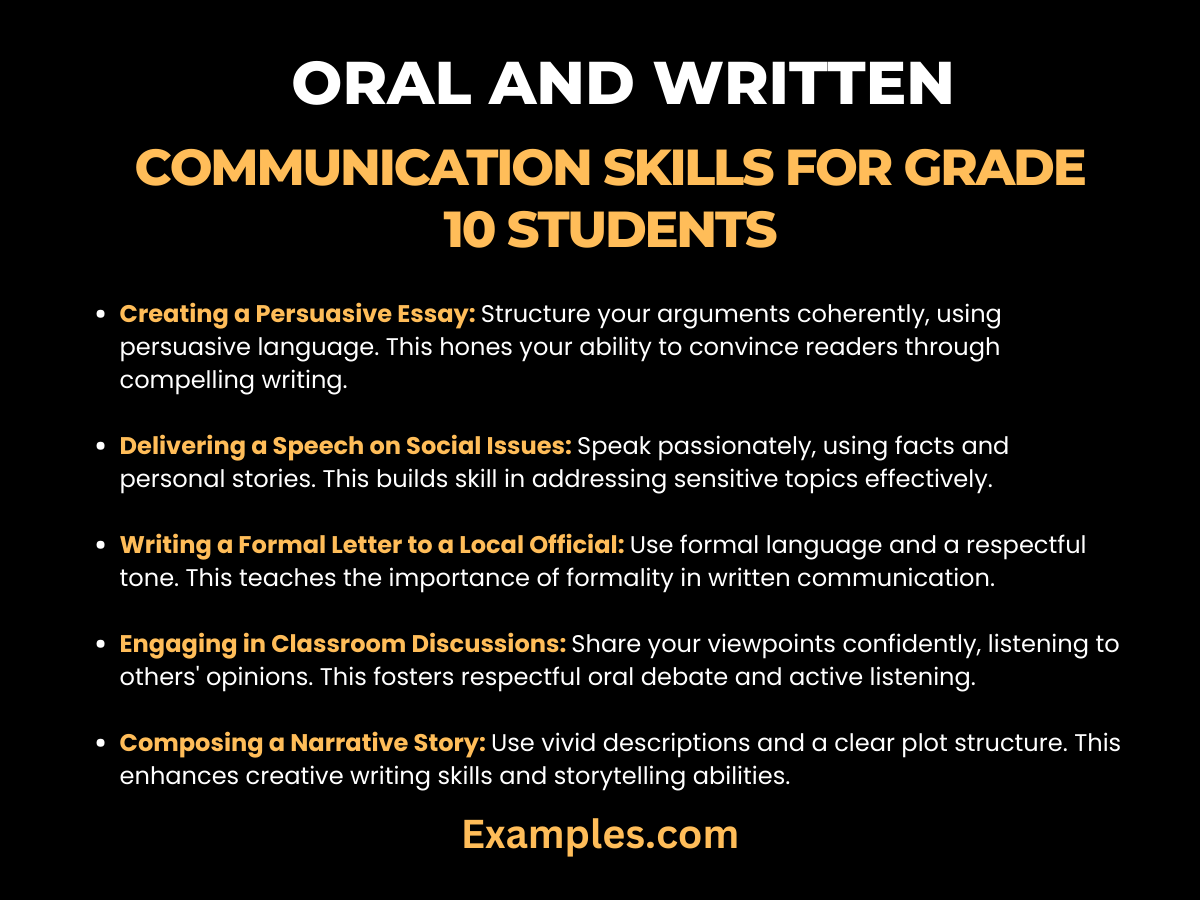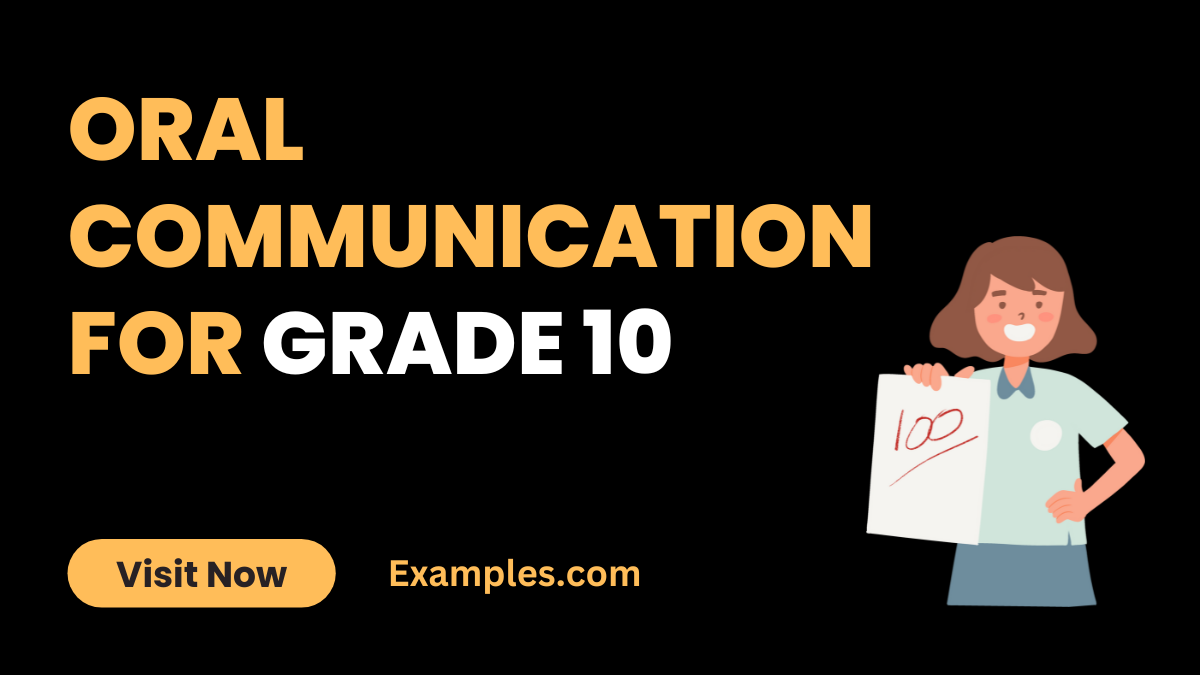19+ Oral Communication for Grade 10 Examples
Discover the essentials of Oral Communication for Grade 10 with our complete guide, tailored to enhance your speaking skills. This resource is packed with practical sentence examples, offering a deep dive into various aspects of effective communication. Whether you’re preparing for a presentation, participating in class discussions, or simply looking to improve your conversational abilities, our guide provides invaluable insights. Dive into a world of oral Communication Examples that will empower you to communicate confidently and assertively in any setting. Perfect for students, teachers, and anyone eager to master the art of speech.
20 Examples of Oral Communication for Grade 10
Explore our curated list of 20 Examples of Oral Communication for Grade 10, designed to enhance your communication skills in various scenarios. This comprehensive collection, rich in SEO and NLP-friendly content, is perfect for students looking to refine their speaking abilities. Each example comes with a concise two-line explanation, demonstrating effective communication strategies. From classroom presentations to everyday conversations, these examples cover a wide range of situations, equipping students with the tools to express themselves confidently and effectively.

- Presenting a Science Project: Clearly explain your hypothesis and findings, using technical terms accurately. This showcases your understanding and engages your audience.
- Participating in a Debate: Present your arguments logically, backing them up with evidence. This demonstrates critical thinking and persuasive skills.
- Asking Questions in Class: Frame your queries concisely, showing curiosity and eagerness to learn. This encourages open discussion and clarifies understanding.
- Giving a Book Report: Summarize the plot and themes, expressing your personal opinions. This illustrates your comprehension and analytical abilities.
- Discussing Group Project Roles: Communicate your strengths and preferences. This fosters teamwork and ensures effective role distribution.
- Explaining a Math Problem: Break down the solution step-by-step, using clear language. This helps peers understand complex concepts.
- Leading a Class Discussion: Encourage participation and respect diverse opinions. This displays leadership and facilitation skills.
- Negotiating in a Role-play: Use persuasive language while respecting the other party’s viewpoint. This teaches negotiation and empathy.
- Describing a Historical Event: Provide details vividly, connecting past events to present implications. This enhances learning and critical thinking.
- Conducting an Interview: Ask open-ended questions and listen actively. This shows engagement and gathers comprehensive information.
- Reciting a Poem: Use tone, pace, and emotion to convey the poem’s essence. This develops presentation skills and emotional expression.
- Making an Announcement: Deliver information clearly and concisely, ensuring understanding. This is key in conveying important messages effectively.
- Offering Feedback to Peers: Be constructive and kind, focusing on improvement. This builds a positive learning environment.
- Explaining a Hobby or Interest: Share your passion engagingly, using descriptive language. This fosters connection and personal expression.
- Participating in a Mock Trial: Argue your case convincingly, using legal terminology. This sharpens logical reasoning and public speaking skills.
- Giving Directions: Communicate steps clearly and logically. This is essential for clarity and helping others.
- Reporting on a Current Event: Summarize key points and provide context. This develops awareness and communication of real-world issues.
- Persuading in a Sales Pitch: Highlight benefits convincingly, appealing to your audience’s needs. This enhances persuasive and marketing skills.
- Requesting Assistance from a Teacher: Speak respectfully and clearly state your needs. This encourages effective and respectful communication.
- Participating in a Cultural Exchange Program: Share about your culture clearly and respectfully, promoting understanding and diversity. This broadens perspectives and cultural awareness.
Oral and Written Communication Skills for Grade 10 Students
In the dynamic world of Grade 10, mastering both oral and written communication skills is crucial. This guide offers insights into effectively expressing ideas through speech and writing. It’s tailored for students aiming to excel in academic and personal communication. Here, you’ll find strategies to enhance articulation and writing clarity, vital for success in Grade 10 and beyond. Perfect for those seeking to refine their expressive abilities.

- Creating a Persuasive Essay: Structure your arguments coherently, using persuasive language. This hones your ability to convince readers through compelling writing.
- Delivering a Speech on Social Issues: Speak passionately, using facts and personal stories. This builds skill in addressing sensitive topics effectively.
- Writing a Formal Letter to a Local Official: Use formal language and a respectful tone. This teaches the importance of formality in written communication.
- Engaging in Classroom Discussions: Share your viewpoints confidently, listening to others’ opinions. This fosters respectful oral debate and active listening.
- Composing a Narrative Story: Use vivid descriptions and a clear plot structure. This enhances creative writing skills and storytelling abilities.
- Participating in a Panel Discussion: Articulate your thoughts clearly, engaging with panelists’ views. This develops diplomacy and collaborative speaking skills.
- Drafting a Research Paper: Present information logically, backed by research. This cultivates analytical writing and critical thinking.
- Giving a Book Presentation: Combine oral explanation with written notes. This demonstrates the ability to synthesize and present information cohesively.
- Writing an Opinion Piece for the School Newspaper: Express your views clearly, supporting them with evidence. This develops persuasive writing and critical analysis skills.
- Conducting an Interview for a Class Project: Prepare questions in advance and engage actively during the interview. This blends written preparation with oral communication proficiency.
Oral and Verbal Communication for Grade 10 Students
Immerse yourself in the dynamic world of Oral and Verbal Communication for Grade 10 Students. This guide is crafted to boost your verbal skills, featuring rich, SEO and NLP-friendly content, ideal for young learners. Gain mastery over spoken language through our 10 unique examples, each accompanied by a brief explanation on effective communication strategies, tailored specifically for Grade 10 students. Elevate your speaking prowess and engage confidently in diverse conversational settings.
- Responding to Literature Critically: Share your perspective on a literary piece, articulating your thoughts coherently. This nurtures critical thinking and expressive speaking.
- Explaining a Science Experiment: Detail the procedure and results, using scientific terminology precisely. This enhances understanding and academic communication.
- Participating in a Student Council Meeting: Voice your opinions and suggestions assertively, promoting constructive discussion. This cultivates leadership and advocacy skills.
- Delivering a Persuasive Speech: Argue a point with conviction, using rhetorical devices effectively. This sharpens persuasion and public speaking skills.
- Narrating a Personal Experience: Tell your story engagingly, connecting with your audience emotionally. This enhances storytelling and emotional intelligence.
- Engaging in a Cultural Discussion: Share insights about different cultures, promoting inclusivity and understanding. This encourages global awareness and respect.
- Explaining a Geographical Concept: Describe geographical phenomena clearly, linking them to real-world implications. This aids in learning and clear communication.
- Discussing a Current Technological Trend: Talk about new technology, assessing its impact and potential. This fosters tech-savviness and future thinking.
- Conducting a Peer Interview: Pose thoughtful questions and respond effectively. This develops interpersonal and interviewing skills.
- Presenting a Health and Wellness Topic: Discuss health-related issues with sensitivity and awareness. This is vital for spreading awareness and promoting well-being.
Which is the Easiest Method of Communication and Why in Class 10th?
In Class 10, students encounter various communication methods, but assertive communication often stands out as the easiest and most effective. This style is straightforward and respectful, making it ideal for young learners. Assertive communication strikes a balance between passive and aggressive styles, allowing students to express themselves clearly without overriding others’ opinions.
Assertive communication in Class 10 is particularly beneficial due to its straightforward nature. Students can convey their thoughts and feelings directly, without resorting to indirect hints or aggressive language. This clarity reduces misunderstandings and fosters a more positive and productive classroom environment.
Moreover, this communication style encourages active listening and empathy. By acknowledging others’ perspectives, students learn the importance of mutual respect and understanding. This not only enhances their communication skills but also builds strong, respectful relationships with peers and teachers.
In addition, assertive communication is adaptable to various situations, from group discussions to one-on-one conversations with teachers. It’s especially valuable in situations like resolving conflicts, participating in debates, and collaborating on projects. By using assertive communication, students can navigate these scenarios with confidence, ensuring their voices are heard while also valuing others’ contributions.
What are the 10 Oral Communication Activities?
- Group Discussions: Encourage students to participate in group discussions, focusing on assertive communication. This activity helps in building confidence and improves the ability to articulate thoughts clearly.
- Role-playing Scenarios: Create scenarios where students practice assertive communication in different settings, like peer interactions or teacher-student conversations. This aids in understanding real-life application of assertive communication skills.
- Debate Sessions: Organize debates on various topics, encouraging students to assertively present their viewpoints. This enhances their ability to argue respectfully and listen actively.
- Presentation Skills: Assign presentations on subjects of interest. Focus on the assertive communication aspect, emphasizing clear and confident speech delivery.
- Impromptu Speaking: Conduct impromptu speaking sessions, where students speak on a topic for a short duration. This sharpens their quick thinking and assertive speaking abilities.
- Peer Feedback Sessions: After presentations or speeches, encourage students to give and receive feedback assertively. This helps in developing constructive criticism skills.
- Interview Simulations: Simulate interview scenarios, allowing students to practice assertive communication in a formal setting. This is especially beneficial for career preparation.
- Public Speaking Exercises: Incorporate public speaking exercises, focusing on voice modulation, clear articulation, and assertiveness in delivery.
- Storytelling Activities: Use storytelling to encourage expressive and assertive communication. This can be done individually or in groups, fostering creative and assertive expression.
- Assertive Communication Workshops: Conduct workshops specifically on assertive communication, covering its techniques and benefits. This provides students with a dedicated space to learn and practice assertiveness in communication.
In conclusion, the journey through Oral Communication for Grade 10 is not just about mastering the art of speaking; it’s about nurturing the ability to express oneself effectively and confidently in various settings. From classroom discussions to real-world interactions, the skills developed here are foundational for both academic success and personal growth. As highlighted by Stanford University’s The College Puzzle, communication skills are vital not only for a student’s academic success but also for their future career prospects, emphasizing the necessity of a strong foundation in assertive communication skills in today’s challenging environment.
Moreover, as per Reading Rockets, the process of language development is a natural and innate journey, where children learn not just by imitation, but also by navigating and internalizing the complexities of language on their own. This learning extends beyond mere rule-following to forming meaningful connections and making sense of experiences through interaction. This resonates with the essence of oral communication in Grade 10 – it’s not just about the mechanics of speech, but about developing the ability to interact, engage, and connect with others meaningfully.
For further reading on the importance of oral communication skills in students, visit The College Puzzle by Stanford University, and to explore the intricacies of language development, Reading Rockets offers an insightful overview at Reading Rockets – Young Children’s Oral Language Development.



